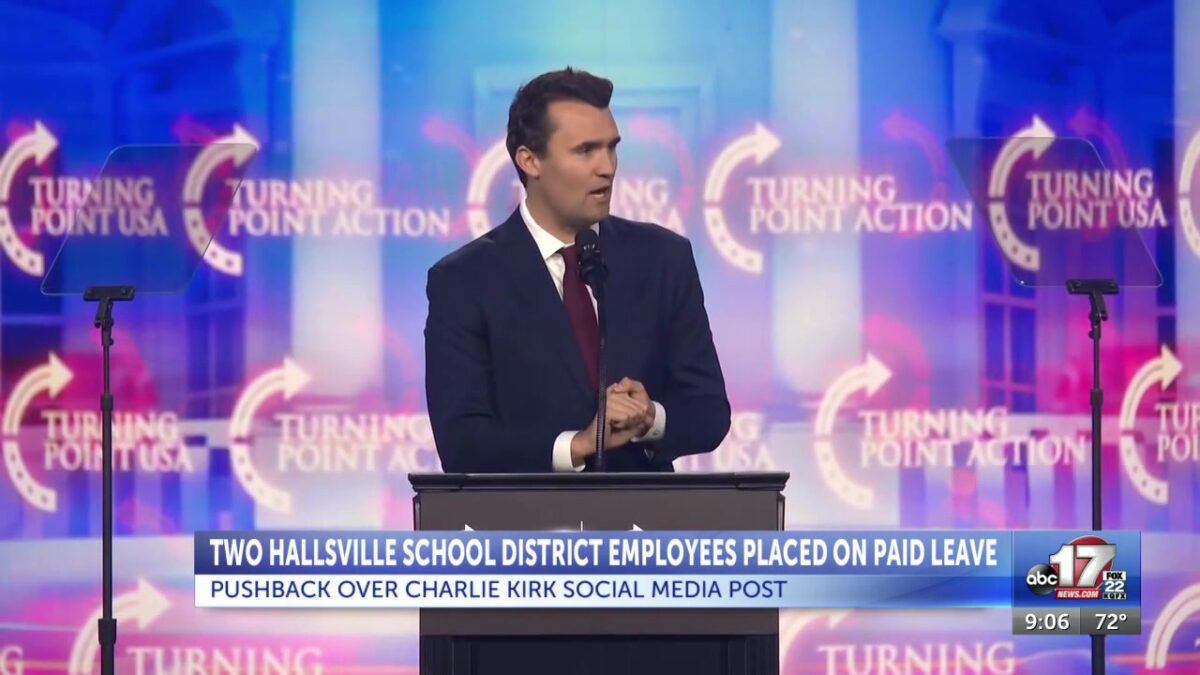Hallsville School District employees placed on paid administrative leave after sharing Charlie Kirk posts

Ryan Shiner
EDITOR’S NOTE: Attribution to a Charlie Kirk quote has been added.
COLUMBIA, Mo. (KMIZ)
Two employees of the Hallsville School District have been placed on paid administrative leave following public pushback over social media posts about political commentator Charlie Kirk.
Kirk, a divisive figure who was the founder of Turning Point USA – a group aimed at promoting conservative viewpoints — was shot and killed during an event last Wednesday at a college campus in Utah. Events were held around Mid-Missouri in the past week for Kirk, including in Boonville and on the University of Missouri’s campus, where Kirk was expected to appear later this month.
The school district wrote in a letter to parents that the employees were on leave pending the outcome of a review.
“We want to clarify that social media posts made by employees of the school district in their personal capacities and outside of their school duties do not reflect the opinions of the District or the Board of Education, nor are they endorsed in any way by the District. As a public school district, we recognize that our role is to create a learning environment where all students feel safe and valued,” the letter says.
Public discourse around Kirk’s shooting has ramped up, mostly around Kirk’s statements. National reports say several people have been targeted by an anonymous doxing website, which has led to some being fired from their jobs.
Comments and reactions around the two Hallsville School District employees emerged on social media after multiple posts were shared by “The Real Columbia Missouri,” a popular Facebook page and website where users frequently engage in political discussions.
State Rep. John Martin (R-Columbia) had commented about the situation on his social media page, demanding that the employees be fired.
“To extend no empathy means you don’t care about someone’s pain, utter disregard, blaming, ridiculing or dismissing someone’s struggles or tragic situations. So, when these two teachers say they do not care that a person was assassinated in our country, they are promoting violence against people with whom you disagree,” Martin wrote on Facebook.
Kirk, a prominent figure in the modern conservative movement, had previously called empathy a “made-up, new age term.” Kirk went on to say on his Oct. 12, 2022, show that he preferred the term “sympathy.”
Screenshots shared around social media of the Hallsville employees had included both employees sharing the same post that called Kirk a white nationalist while calling for an end to gun violence.
“May all of our children grow up to live in a country that values their lives enough to take gun violence seriously and reject any person who would try to justify senseless gun-related deaths – especially the deaths of children,” the post shared by the employees says.
The quoted post was shared from a social media page called “So Informed,” and screenshots do not show the employees giving additional comments.
The school district wrote in its letter that the employees had “voluntarily removed the posts.”
Director of Litigation Freedom of Missouri Dave Roland says the First Amendment plays in a role in situations like this, but it often depends.
Statements that are made outside of school will receive more protections than statements made in the classrooms or during school hours, according to Roland.
“If a teacher makes a social media post while they are on the clock, then arguably they are acting in their capacity as a public employee rather than as a private citizens, who you, wishes to make a statement on a matter of public interest that really needs to wait until after you’re off the clock,” he said.
The post shared by the two employees did not promote illegal activity or illegal relationships, Roland said.
When it comes to sharing a post instead of writing one of your own, Roland says that could also play a factor.
“If you are simply reposting what somebody else said, at least in a defamation context, that’s not usually attributed as the speech of the person who’s doing the reposting. You might just be sharing that so other people will be aware of what that person said, it not necessarily your speech or intentions,” Roland said.